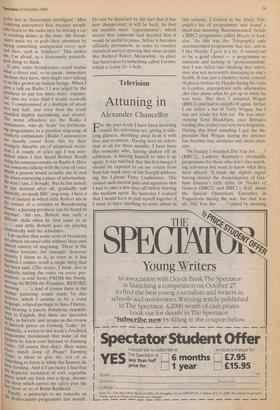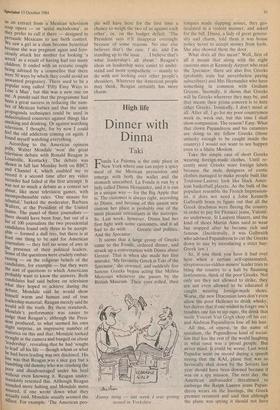Television
Attuning in
Alexander Chancellor
uor the past week I have been hovering round the television set, giving it side- long glances, shrinking away from it with fear and revulsion. Having seen no televi- sion at all for three months, I have been like someone who, having shaken off an addiction, is forcing himself to take it up again. It was bad luck that the first images I should be exposed to on my return from Italy last week were of Mr Scargill address- ing the Labour Party Conference. This caused such mental pain and agitation that I had to take a few days off before braving the medium again. By Saturday I realised that I would have to pull myself together if were to have anything to write about in this column. I looked at the Daily Tele- graph's list of programmes and found a small star meaning 'Recommended' beside a BBC2 programme called Haydn in-Lon- don. As this was the Telegraphs only recommended programme that day, and as I like Haydn, I gave it a try. It turned out to be a good choice — a programme so innocent and lacking in 'professionalism' that I was lulled into thinking that televi- sion was not necessarily damaging to one's health. It was just a chamber music concert of pieces written by Haydn during his visits to London, interspersed with informative chit-chat about what he got up to while he was here. But then I sampled Wogan (BBC1) and had to switch off again. In fact I am rather a fan of Terry Wogan, but I was not ready for him yet. He was inter- viewing Tony Blackburn, once Britain's leading disc jockey and now best forgotten. During this brief sampling I got the im- pression that Wogan during my absence has become less unctuous and more abra- sive.
On Sunday I watched Did You See. . . ? (BBC2), Ludovic Kennedy's invaluable programme for those who don't like watch- ing television but want to know what they have missed. It made me slightly regret having missed the dramatisation of Gra- ham Greene's little fable Dr Fischer of Geneva (BBC2) and BBC1's SOE about the Special Operations Executive in Yugoslavia during the war, but that was all. Did You See ? ended by showing
us an extract from a Mexican television soap opera — or 'serial melodrama', as they prefer to call it there — designed to persuade Mexicans to use birth control. We saw a girl in a slum become hysterical because she was pregnant again and fero- ciously attack her mother for looking 'a wreck' as a result of having had too many Children. It ended with an ecstatic couple being advised by a counsellor that there Were 50 ways by which they could avoid an unwanted pregnancy. There used to be a Popular song called 'Fifty Easy Ways to Lose a Man', but this was a new one on me. A pundit said that the programme had been a great success in reducing the num- ber of Mexican babies and that the same Propaganda techniques could be used in industrialised countries against things like smoking and drinking. Or against watching television, I thought, for by now I could feel the old addiction coming on again. I found myself watching everything. According to the American opinion Polls, Walter Mondale 'won' the great television debate with Ronald Reagan in Louisville, Kentucky. The debate was Shown in full last Monday both on BBC1 and Channel 4, which enabled me to record it a second time after my video recorder had failed at the first attempt. It was not so much a debate as a contest set about, like most television games, with Incomprehensible rules. 'One minute for rebuttal, barked the moderator, Barbara Walters, at the President of the United States. The panel of three journalists there should have been four, but out of a list of 100 journalists the two presidential candidates found only three to be accept- able — formed a dull trio, but there is at least one thing to be said for American Journalists — they feel no sense of awe in the presence of their political leaders. Some of the questions were crudely embar- rassing — on the religious beliefs of the candidates, for example — but they were the sort of questions to which Americans Probably want to know the answers. Both candidates had said before on television What they hoped to achieve during the debate, Mondale said he would show himself warm and human and of true leadership material; Reagan merely said he Would tell the truth. By these standards, IY1Ondale's performance was easier to Judge than Reagan's, although the Presi- dent produced, to what seemed his own slight surprise, an impressive number of statistics on this and that. Mondale looked Straight at the camera and banged on about leadership', revealing that he had 'sought to lead' all his life — though whom or what had been leading was not disclosed. His line was that Reagan was a nice guy but a humbling old dummy who was crushing the Poor and disadvantaged under his heel Without even knowing it. Reagan under- standably resented this. Although Reagan sounded more halting and Mondale more assured, if one wrote down what they actually said, Mondale usually seemed the Silliest. For example: 'The American peo-
pie will have here for the first time a chance to weigh the two of us against each other', or, on the budget deficit: 'The President says it'll disappear overnight because of some reasons. No one else believes that's the case. I do, and I'm standing up to the issue. . . I believe that's what leadership's all about.' Reagan's ideas on leadership were easier to under- stand and more sympathetic — mainly to do with not looking over other people's shoulders. Whatever the American people may think, Reagan certainly has more charm.























































 Previous page
Previous page